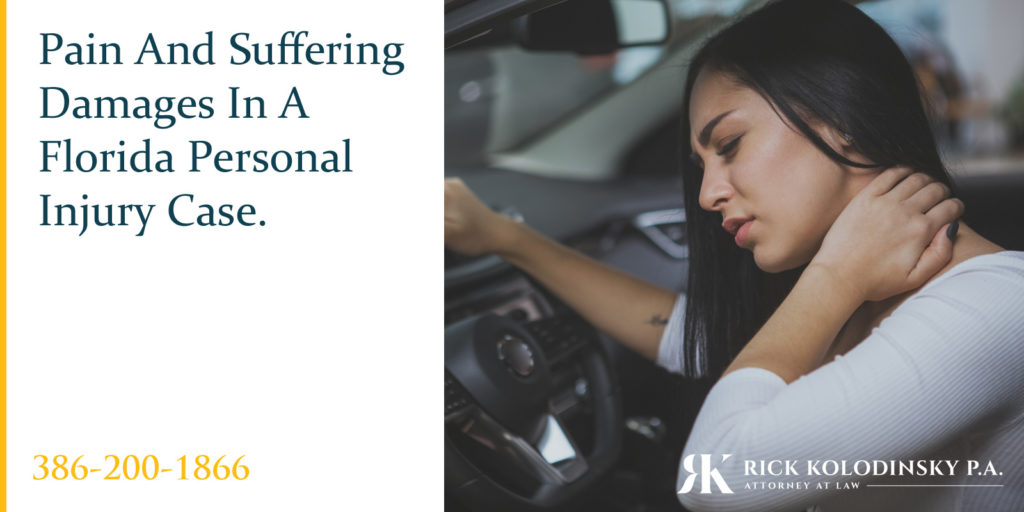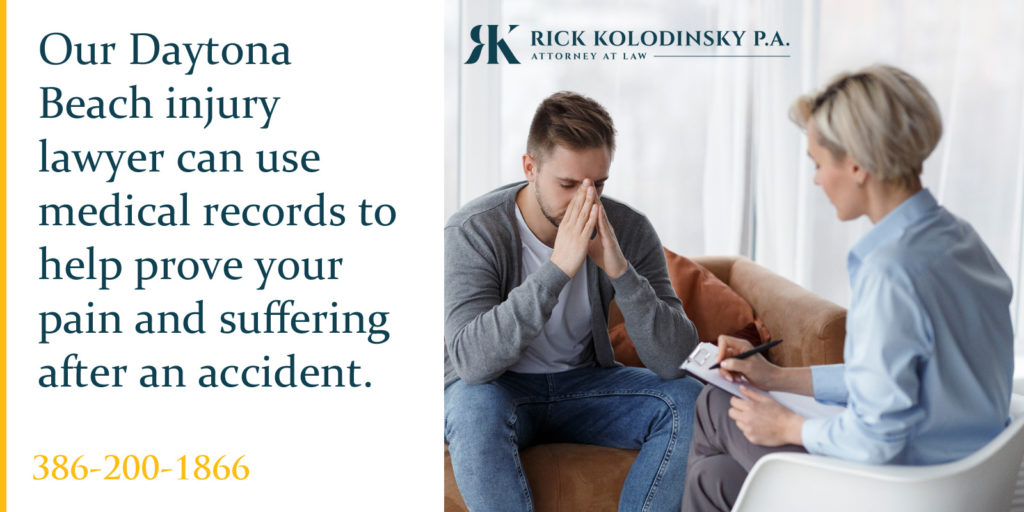
Blog
Pain And Suffering Damages In A Florida Personal Injury Case
Do you have reason to believe that you’re in a position to file a Florida personal injury claim? Are you wondering which steps you can take to obtain compensation for your losses? Are you concerned about securing enough money to manage all the damages related to your accident? On the plus side, there are many types of damages that move to the forefront during a Florida personal injury case. This gives you the opportunity to seek all the money that may be rightfully owed to you. Keep in mind however, that some damages are more difficult to collect than others, such as those for emotional pain and suffering. Our experienced Daytona Beach injury lawyer at Rick Kolodinsky, P.A. explains how to seek and prove pain and suffering damages in a Florida personal injury case.
What is pain and suffering?
The Cornell Law School Legal Information Institute defines pain and suffering as follows:
“Pain and suffering refers to the physical discomfort and emotional distress that are compensable as noneconomic damages. It refers to the pain, discomfort, anguish, inconvenience, and emotional trauma that accompanies an injury.”
Building off that definition, pain and suffering injuries fall into one of two categories:
- Physical pain and suffering: Traumatic brain injury, broken bones, burns, abrasions, internal organ damage, amputations, and paralysis.
- Mental pain and suffering: mental anguish, fear, insomnia, psychological trauma, cognitive changes, and diminishment of the quality of life.
Understanding what constitutes pain and suffering will help you work with your Daytona Beach personal injury lawyer to formulate a plan for seeking and obtaining compensation for all your damages after an accident.
How to calculate pain and suffering damages
How much money can you sue for pain and suffering damages? The state of Florida does not have specific caps for pain and suffering. In other words, there’s no limit as to how much money you can seek by filing a lawsuit against the negligent party.
Since every personal injury case is unique, there’s no exact science to calculating pain and suffering damages. This is based largely on the specific details of the case.
However, there are two widely accepted methods of calculating damages:
- Per diem method: With this method, a specific dollar amount is assigned to every day of your recovery. This comes to an end when your medical team decides that you’ve recovered fully or your condition is not likely to improve any further.
- Multiplier method: This method takes into consideration the actual damages associated with your claim, such as those for medical bills and lost wages. These damages are then multiplied by a number based on the severity of your injuries. The more severe the injuries, the higher the multiplier. The multiplier is typically between 1.5 and 5.
There are pros and cons of both methods, so it’s best to consult with a good Daytona Beach personal injury lawyer about which one is right for your case.
How to prove pain and suffering damages
It’s one thing to say that your accident resulted in physical and/or mental pain and suffering. It’s another thing entirely to prove this with the goal of increasing the likelihood of receiving maximum compensation for your injuries and related damages.
There are a variety of ways to prove pain and suffering after a Florida accident, including but not limited to:
- Medical records: Keep comprehensive medical records, such as an after summary visit for each appointment and procedure.
- Doctor’s notes: Don’t hesitate to ask your doctor to provide a written statement backing up your injury claims.
- Medical evidence: This can come in many forms, such as test results and surgical procedures to treat your injuries.
- Medication prescriptions: For example, if you’re taking medication for physical pain or emotional instability, it can help to prove your pain and suffering.
- Witness testimony: Family, friends, and co-workers may be able to provide first-hand testimony to how the accident has affected your mental and emotional well-being.
- Photographic evidence: This comes in many forms, such as photographs of the accident scene, the damage, and your injuries.
There’s no such thing as too much evidence when trying to recover pain and suffering damages in a Florida personal injury case. The more evidence you can provide, the easier it is to prove to the insurance company or jury that you deserve to be compensated accordingly.
Keep in mind that since it can be hard to prove emotional pain and suffering, rather than seek damages on your own, it’s generally best to consult with an experienced personal injury attorney.
Seek compensation for pain and suffering with the help of our Daytona Beach injury lawyer
Our Daytona Beach injury lawyer at Rick Kolodinsky, P.A. is a Florida Board-Certified civil trial lawyer with more than 40 years of experience representing injured victims. If you need help seeking compensation for pain and suffering damages in a Florida personal injury case, look no further. Our attorney can answer all your questions, collect all the right evidence to prove your damages, and communicate with the insurance company on your behalf so you can focus on your health and recovery. Contact us online or give us a call to schedule your free consultation.
Categories
Mr. Kolodinsky has been honored by his induction into this prestigious nationwide organization of trial lawyers. Of some 900 lawyers in Volusia Country there are four lawyers so honored.
We don’t sell your information. You can opt out at any time.


